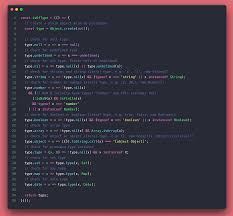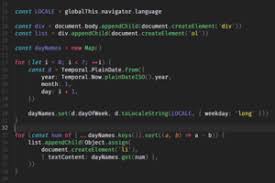Mastering JavaScript Coding: A Guide to Building Dynamic Web Experiences
The Power of JavaScript Coding
JavaScript is a versatile and powerful programming language that has become essential for web development. From creating interactive websites to building complex web applications, JavaScript plays a crucial role in shaping the digital world we live in today.
Why JavaScript?
One of the key reasons for the popularity of JavaScript is its versatility. As a client-side scripting language, JavaScript allows developers to add dynamic elements to their websites, such as interactive forms, animations, and real-time updates without the need to reload the page.
Moreover, with the rise of frameworks like React, Angular, and Vue.js, JavaScript has evolved into a full-fledged ecosystem that enables developers to build robust and scalable web applications with ease.
The Basics of JavaScript
JavaScript is known for its simplicity and flexibility. With just a few lines of code, developers can manipulate HTML elements, handle user interactions, and perform calculations. Variables, functions, loops, and conditional statements are some of the fundamental building blocks of JavaScript coding.
Advanced Concepts
For more experienced developers, JavaScript offers a wide range of advanced concepts to explore. Object-oriented programming, asynchronous programming with Promises and async/await, manipulating the Document Object Model (DOM), and working with APIs are just a few examples of what can be achieved with JavaScript.
Stay Updated
Given its rapid evolution, staying updated with the latest trends and best practices in JavaScript coding is crucial for every developer. Online resources like MDN Web Docs, Stack Overflow, and GitHub repositories provide valuable insights and tools for mastering JavaScript.
In Conclusion
JavaScript coding empowers developers to create dynamic and engaging web experiences that enhance user interaction and drive innovation. Whether you are a beginner or an experienced developer, exploring the endless possibilities of JavaScript can open up new opportunities in the ever-changing landscape of web development.
8 Essential Tips for Writing Clean and Efficient JavaScript Code
- Use meaningful variable names to improve code readability.
- Comment your code to explain complex logic or functionality.
- Follow consistent coding conventions for better maintainability.
- Avoid global variables to prevent variable scope issues.
- Use strict mode (‘use strict’) to catch common coding mistakes.
- Practice DRY (Don’t Repeat Yourself) principle to reduce redundancy.
- Handle errors gracefully with try-catch blocks for robustness.
- Regularly test and debug your code to ensure its correctness.
Use meaningful variable names to improve code readability.
Using meaningful variable names is a fundamental tip in JavaScript coding that significantly enhances code readability. By choosing descriptive names that accurately reflect the purpose of the variables, developers can easily understand the functionality of different parts of the code without needing extensive comments or documentation. This practice not only makes the code more accessible to others but also helps maintain and debug the code more efficiently. Investing time in selecting clear and concise variable names can lead to more maintainable and understandable JavaScript code in the long run.
Comment your code to explain complex logic or functionality.
When writing JavaScript code, it is essential to comment your code to explain complex logic or functionality. Comments serve as documentation that helps both yourself and other developers understand the purpose and implementation of specific code segments. By providing clear explanations through comments, you can improve the readability and maintainability of your codebase, making it easier to troubleshoot issues and collaborate effectively on projects. Remember, well-commented code not only clarifies the intent behind your logic but also enhances the overall quality of your JavaScript coding practices.
Follow consistent coding conventions for better maintainability.
Following consistent coding conventions in JavaScript is crucial for ensuring better maintainability of your codebase. By adhering to a set of established guidelines for naming conventions, formatting, and structure, developers can enhance readability, collaboration, and scalability of their code. Consistency in coding practices not only makes it easier for team members to understand and work on the code but also facilitates future updates and debugging processes. Embracing uniformity in coding conventions is a best practice that can streamline the development workflow and contribute to the long-term success of your JavaScript projects.
Avoid global variables to prevent variable scope issues.
To prevent variable scope issues in JavaScript coding, it is essential to avoid using global variables. Global variables can lead to unintended consequences, such as variable collisions and unpredictable behavior within functions. By keeping variables localized within the appropriate scope, developers can maintain code clarity, improve readability, and reduce the risk of bugs caused by variable scope conflicts. Embracing proper variable scoping practices not only enhances code maintainability but also contributes to a more robust and reliable JavaScript application.
Use strict mode (‘use strict’) to catch common coding mistakes.
When working on JavaScript coding, it is highly recommended to utilize strict mode by including the directive ‘use strict’ at the beginning of your scripts. This practice helps catch common coding mistakes and enforce stricter rules in the language, leading to cleaner, more reliable code. By enabling strict mode, you can avoid potential errors, improve code quality, and ensure that your JavaScript programs adhere to best practices for better maintainability and readability.
Practice DRY (Don’t Repeat Yourself) principle to reduce redundancy.
Practicing the DRY (Don’t Repeat Yourself) principle in JavaScript coding is essential to minimize redundancy and improve code efficiency. By avoiding duplicating code segments and instead encapsulating them into reusable functions or modules, developers can streamline their workflow, enhance code maintainability, and reduce the risk of errors. Embracing the DRY principle not only leads to cleaner and more organized code but also promotes a more sustainable approach to software development, enabling easier troubleshooting and future scalability of projects.
Handle errors gracefully with try-catch blocks for robustness.
When coding in JavaScript, it is essential to handle errors gracefully to ensure robustness in your applications. One effective way to achieve this is by using try-catch blocks. By wrapping potentially error-prone code within a try block and catching any exceptions in the catch block, you can prevent crashes and unexpected behavior, making your code more reliable and maintainable. Implementing try-catch blocks demonstrates a proactive approach to error handling, enhancing the overall stability and performance of your JavaScript applications.
Regularly test and debug your code to ensure its correctness.
Regularly testing and debugging your JavaScript code is essential to ensure its correctness and functionality. By conducting thorough testing, you can identify and fix any errors or bugs that may impact the performance of your code. Debugging allows you to trace and resolve issues efficiently, improving the overall quality of your codebase. Prioritizing testing and debugging practices not only helps maintain a stable and reliable application but also enhances your coding skills by fostering a mindset of continuous improvement and attention to detail.




